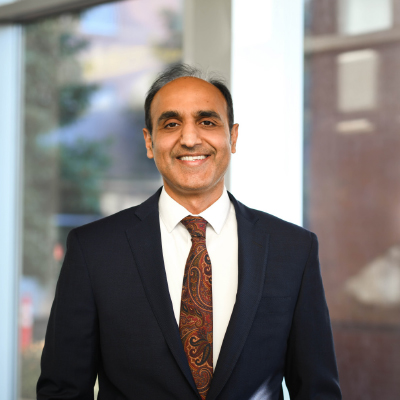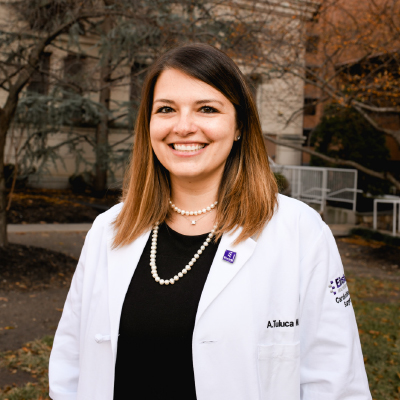Heart Health Champions
The region’s top heart experts dish on the latest advances in heart care and the best ways to stay heart healthy.
Brought to you by Main Line Health Lankenau Heart Institute
It’s Never Too Early to Start Heart-Healthy Habits
Whether heart disease runs in the family or you’re just looking to stay on top of your heart health, Dr. Mara Caroline, an interventional and critical care cardiologist with Main Line Health, shares how lifestyle changes make all the difference.

What is your role at the Lankenau Heart Institute? As an interventional cardiologist, I treat patients who have complex coronary artery and/or peripheral artery disease. Additionally, I specialize in integrative medicine, which means I incorporate evidence-based lifestyle and alternative medicine approaches to promote heart and vascular health. I work with each of my patients to create a personalized care plan which incorporates making small changes to diet, lifestyle, medications/ supplements and exercise, among other things.
At what age should women start to pay attention to their heart health? First, know that it’s never too early to prioritize your heart health. While heart disease symptoms typically present among women between the ages of 40-50, the risk factors for heart disease can actually begin as early as your 20s! This is because it often takes several years for heart disease risk factors to become clinically apparent and manifest as physical symptoms. Because heart disease risks can begin so early, it’s especially important to practice heart-healthy habits. While most women aren’t worried about factors like blood pressure or cholesterol in their 20s, this is actually the perfect time to start to get familiar with key health indicators and talk to your doctor about genetic cardiac risk and preventive cardiac screenings. The bottom line is that it’s never too soon to talk to your primary care provider about your heart health.
Heart disease is the number-one killer of women over the age of 25. Is this in part because women don’t know they have it? It’s true that many women do not realize that they have or are at risk for heart disease. But another reason heart disease is more fatal among women than men is that women are less likely to recognize heart disease symptoms and seek medical attention for them. I encourage all women to know their symptoms for heart attack—nausea/ vomiting; shortness of breath; neck, jaw, shoulder and back pain; fatigue; sweating; indigestion—and call 911 immediately if they’re experiencing these symptoms.
Whether heart disease runs in the family or not, what preventative measures should patients take to keep their heart healthy?I strongly recommend that anyone with a family history of heart disease meet with a preventive cardiologist. If heart disease or its risk factors are identified early, it’s more likely that lifestyle changes—in conjunction with medication—will reduce your overall heart-disease risk. The majority of heart disease cases can be prevented by playing close attention to diet, and managing lifestyle issues like stress, sleep and exercise. The rules are the same whether you’re trying to prevent heart disease, lose or maintain weight, or just feel good: you need to eat right, exercise, sleep and reduce stress. Above all, I encourage my patients to remain motivated and don’t get discouraged.
Brought to you by Crozer Keystone Health System
It’s All Connected
The cardiovascular system starts and ends at the heart—as it pumps blood through the entire body. Dr.Muhammad Raza, an interventional and cardiovascular cardiologist with Crozer-Keystone, explains how heart health is linked to all parts of the body.

How does interventional cardiology differ from preventative cardiology? Preventative cardiology is more focused on how to prevent a disease from happening or progressing, whereas interventional cardiology is more focused on fixing the disease when the disease is advanced. Every cardiologist does practice preventative cardiology, but interventional cardiologists also perform procedures to fix a mechanical problem in the cardiovascular system.
You played a significant role in bringing the transcatheter aortic valve replacement (TAVR) procedure to the Delaware Valley. Can you explain the process? The usual, old- fashioned treatment was cracking the chest open to surgically place a new valve. Whereas the transcatheter aortic valve replacement procedure is a minimally invasive procedure where we do not open the chest, we rather enter the groin through a one to two millimeter incision, which you can’t even see after a few days. We place a catheter in the femoral artery in the groin and through that catheter we deliver the new valve in the aortic valve position. The new valve immediately starts to function and alleviate the symptoms. About 6 to 8 hours after the procedure, the patient is walking around and eating with no problem. Then, 24 to 48 hours later, the patient goes home with no significant limitations on activities.
What impact do you see the TAVR procedure having on patients? The heart is like a house and the valves are like doors. If the doors are not opening well, the heart cannot function well. The aortic valve is the main door of the house, the main valve of the heart and the last valve the blood has to go through to get to the body. So if the aortic valve doesn’t open the way it should, the heart can’t perform well because it can’t push the blood through the body. In response, the heart muscle has to work harder and becomes thick. Just like when you work out at the gym and you put pressure and stress on your muscles, your muscles get bigger. The same thing happens to the heart: The muscle has to be thicker, stiffer and bigger to function. This can lead to to chest discomfort, shortness of breath and loss of consciousness or syncope.
How does high cholesterol impact cardiovascular health? Blockages are made up of plaque from high cholesterol which circulates through the entire body. This forms plaques and blockages everywhere, including the blood vessels in the heart, neck and legs, which can cause a heart attack or stroke. Opening the blood flow to the legs can alleviate leg pain. In the heart, plaque and blockages can lead to heart attacks or symptoms of chest discomfort, which is called angina. If we open up those blood vessels it can help prevent heart attacks and improve lifestyle.
Brought to you by Einstein Healthcare Network
Heart Disease Is as American as Apple Pie
Heart disease continues to rise in the U.S. Heart surgeon Dr. Alexandra Tuluca, Associate Chief of Cardiac Surgery at the Einstein Healthcare Network, explains how the American lifestyle contributes to this public health concern.

Are men at higher risk of heart disease than women? A lot of traditional research studies investigating the effects of heart disease largely included male patients only. Since female patients were not often included with equal representation in these older studies, there was a misconception by many that women don’t get heart disease and that is categorically not true. As one of only few female heart surgeons in this country, I see plenty of women with this condition. One in five women in this country dies of heart disease.
You were born in Romania where your grandfather was also a surgeon. Did that influence your desire to become a surgeon? Definitely. For as long as I can remember I’ve always wanted to be a doctor. Growing up, I was very close with him and he was a well-regarded surgeon in his community in Ro- mania. I am living the American dream: I moved here as a young teen- ager, worked hard, and after medical school, I became greatly interested in cardiac surgery, following in the footsteps of my grandfather.
Has technology changed how you perform surgery since the beginning your career? I’ve seen a shift toward minimally invasive procedures. For example, nowadays, I routinely perform catheter-based procedures that can be done without making an incision in the chest and repair heart valves. Heart surgery didn’t establish itself until the late 1950s and we’ve made exponential progress in not only the surgeries but also the recovery process and reducing risks.
s heart disease on the rise globally? Globally, in comparable countries to the U.S., deaths from heart disease are on the decline. However, in the U.S., deaths from heart disease are on the rise. Diet— mostly portion sizes—are a huge contributor to this problem along with obesity and inactivity. France and Japan, for example, have one of the lowest rates of heart disease because part of the culture involves a lot of physical activity during the day there, but it surprisingly might not include going to the gym: it’s walking to work or the store. Americans drive everywhere and activity isn’t built into our routine. I also think our lives are a lot more stressful— stress contributes to heart health.
In addition to taking medication, how can patients improve their heart health? Increasing activity, practicing portion control and de-stressing are the biggest things. Incorporating some form of physical activity or exercise into the daily routine; 30-40 minutes, 4-5 days a week of just walking. It’s a part of our daily routine that’s missing and is what probably needs to change. People underestimate the value of very basic physical activity because they think they must get a gym membership and start working out, but it’s even simpler than that. An effort at even basic physical activity improves cardiovascular health and importantly reduces stress.
Brought to you by Doylestown Health
Don’t Miss A Beat
While an irregular heartbeat is common, it’s not entirely harmless. Dr. John Harding explains when and how to pay attention to arrhythmias.

What is a common misconception about arrhythmias? Generally, arrhythmias are a problem where the heart beat is either too slow or too fast. Many patients think it will be a life- long condition, limiting quality of life or even shortening lifespan. But there are very good therapies for the spectrum of arrhythmias that we treat, so patients diagnosed with this condition can live long and fruitful lives.
Many people experience an irregular heartbeat, and it’s often not anything to worry about. But when should a patient pay closer attention and see an electrophysiologist? Everybody feels heart arrhythmias in different ways, but there are situations where we suggest that patients follow up with an electrophysiologist (a cardiologist that specializes in heart arrhythmias). It’s more serious if a person passes out or nearly pass- es out, experiences additional symptoms such as chest pain, shortness of breath that limits activity, or is having trouble breathing at night. It is also important to highlight that for rhythm disturbances such as atrial fibrillation, women can feel different symptoms, report worse quality of life from the arrhythmia, and may not be on important therapies such as blood thinning medications when compared to their male counterparts.
What would you recommend to someone experiencing harmless arrhythmias? I think it is very important to focus on lifestyle measures to control cardiac arrhythmias, whether they are benign or more dangerous. Lifestyle measures such as stress management, exercise, reduction in salt and alcohol use, diagnosis and treatment of sleep apnea, and blood pressure control can very effectively help control cardiac arrhythmias such as atrial fibrillation. These strategies work hand in hand with other advanced measures that we offer in electrophysiology.
How did you decide to go into your specialty? I was drawn to electro- physiology because it combines a high level of analytical thinking and medical innovation in a procedural based specialty. I was also very lucky to have exceptional mentors early on in my career who helped guide this decision. I have a passion for treating cardiac arrhythmias and enjoy making a positive difference in the quality of life of my patients.
You went to medical school and completed your residency/fellowship training in Philly, and now practice in Doylestown. What’s kept you within this area? I’m a Philadelphia ‘lifer.’ I was born and raised, completed my medical training, and have practiced medicine for almost twenty years here. I live and die by Philly sports. My wife, family and I love Philadelphia and very much enjoy all that the Bucks county region has to offer. It’s a fantastic mix of the great outdoors with beautiful hiking, as well as great restaurants and local craft breweries. It is an honor to care for patients in the Doylestown community, and I hope to do that for years to come.